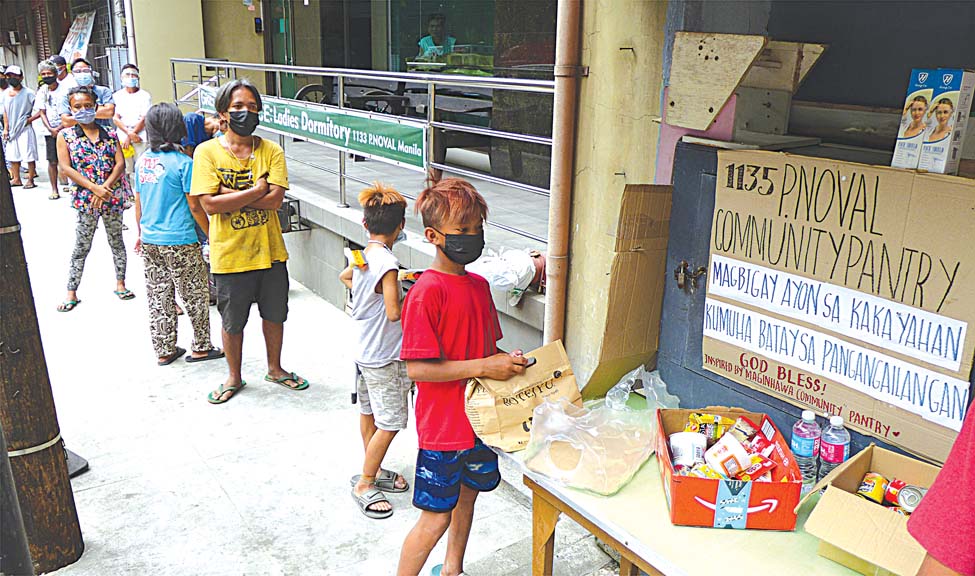
FILIPINOS were deemed among the least generous people compared to those living in other Southeast Asian countries in the latest edition of the London-based institution Charities Aid Foundation (CAF) World Giving Index 2021.
The Philippines ranked 65th out of 114 with an overall score of 33 percent. Indonesia, one of the country’s peers in the Asean, topped the index in the region and in the world with a score of 69 percent.
While technical considerations prevented a survey in 2019, CAF data showed the country’s ranking improved from 2018 when it ranked 89th out of 144 with a score of only 28 percent. In the 10-year average of the index released in 2020, the country ranked 33rd out of 126 overall with a score of 39 percent.
“Our domestic research in various countries that form part of the CAF Global Alliance tells us that willingness to give was not drastically diminished, it was opportunity that went missing—the chance to give that had to be sacrificed as countries locked down their people and their economies,” CAF Chief Executive Neil Heslop said. “While those lockdowns undoubtedly saved lives, they also shut off [a] myriad [of]everyday opportunities to give.”
The overall score of countries included in the index is based on a simple average of a country’s score on three factors—helping strangers; donating money to charity; and volunteering their time to an organization.
The main drag in the overall Philippines performance in the index was in donating money to charity where it ranked 99th overall with a score of only 16 percent.
In terms of helping strangers, the Philippines ranked 40th in terms of helping a stranger with a score of 62 percent.
The country’s best performance was in volunteering time to an organization where it ranked 28th overall with a score of 23 percent.
P44.5B of volunteer work
In a public social-media post on Tuesday, the former head of the defunct National Statistical Coordination Board Romulo A. Virola, said the total value of volunteer work in the Philippines reached P44.5 billion, accounting for 0.6 percent of the total GDP 2000-2009.
He noted that volunteerism has been deemed “good for society.” Citing the United
Nations, Virola said, “A society which supports and encourages different forms of volunteering is likely to be a society which also promotes the well-being of its citizens.”
Virola said UN data showed around a billion people volunteer globally and most of them serve in their respective countries.
“The sponsored events, the retail income that charities are able to raise, and the need to shield vulnerable elderly populations who make up significant numbers of volunteers all added up to a funding crisis that continues to haunt charities and their beneficiaries around the world,” Heslop said.
“This year’s results do, however, carry elements of hope and cause for celebration when we examine the tremendous giving cultures in countries where the pandemic has taken a different path,” he added.
Based on the Index, apart from the Philippines and Indonesia, other Asean countries that were included were Myanmar which ranked 4th overall with a score of 51 percent; Thailand, 10th with a score of 46 percent; and Vietnam and Malaysia which ranked 25th and 29th, respectively, but had the same score of 40 percent.
The two other Asean countries in the 2021 index were Lao People’s Democratic Republic, ranking 75th with a score of 32 percent; and Cambodia, 93rd with a score of 28 percent.
The biggest risers in the index were Georgia; Paraguay; Ethiopia; Bulgaria; Vietnam; Serbia; Bangladesh; China; Ukraine; and India. The biggest decliners were Switzerland; Ireland; Netherlands; United States of America; Myanmar; Belgium; Germany; Canada; Malta; and Hong Kong.
“The importance of donations linked to faith can be seen once again in Indonesia, Thailand and elsewhere. The pan-African tradition of ubuntu is evident in the rankings of Kenya and other sub-Saharan nations,” Heslop said.
“The number of people who reported helping a stranger stands at a staggering 55 percent, the highest figure we have recorded in our annual survey and one that speaks to the wave of genuine concern for our neighbors that so many of us witnessed in our day to day lives,” he added.
CAF said the data is based on Gallup’s World View World Poll, an ongoing research project carried out in 114 countries in 2020. Together those countries represent more than 90 percent of the world’s population.
In most countries surveyed, 1,000 questionnaires are completed by a representative sample of individuals living across the country. The coverage area is the entire country including rural areas.
The interviews that were conducted prelockdowns in March 2020 were done face to face while the interviews in May, when data collection resumed, were done via telephone to ensure the safety of interviewers and respondents.
